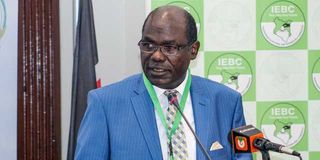Premium
Stage set for filling of vacant IEBC posts

IEBC chairman Wafula Chebukati during an event in Nairobi on November 28, 2019.
What you need to know:
- The President will constitute a seven-member selection panel to oversee the filling of vacant positions in the seven-member commission.
- The panel shall now advertise for the vacancies, shortlist the names, conduct the interviews and send the list of suitable nominees to the President.
The stage is now set for the filling of four vacancies at the electoral agency after President Uhuru Kenyatta signed into law the Independent Electoral and Boundaries Commission (Amendment) Bill, 2019.
The law comes ahead of a possible referendum next year to change the constitution, as recommended by the Building Bridges Initiative (BBI) report, and the 2022 General Election.
This now means that the President will constitute a seven-member selection panel to oversee the filling of vacant positions in the seven-member commission.
The panel shall have two men and two women nominated by the Parliamentary Service Commission (PSC), one person nominated by the Law Society of Kenya (LSK) and two persons nominated by the Inter-Religious Council of Kenya.
The panel shall now advertise for the vacancies, shortlist the names, conduct the interviews and send the list of suitable nominees to the President from where he will pick one for onward transmission to the National Assembly for vetting.
Resigned the commission
The new law will be used as an interim or stop-gap measure pending comprehensive reforms at the IEBC.
Currently, there is no legal framework to deal with emergency cases like filling vacant positions at the IEBC following the resignation of the four commissioners.
The first schedule of the IEBC Act that has been amended only applied to the recruitment of the current commissioners.
Ms Connie Nkatha (vice-chairperson), and members Mr Paul Kurgat and Ms Margaret Mwachanya, resigned from the commission in April last 2018, citing inability to continue working with chairman Wafula Chebukati, whom they accused of high-handedness. The trio have since been appointed by the President as deputy envoys to various missions abroad.
Dr Roselyn Akombe left the commission ahead of the October 26, 2017, repeat presidential election, saying the commission was not committed to a free and fair process.
The departure of the four almost paralysed operations at the IEBC as it left only three commissioners in office — Mr Chebukati and members Abdi Guliye and Boya Molu.
Properly constituted
Whereas the IEBC Act provides that five members shall form a quorum in the plenary, a court ruling on whether the commission was properly constituted following the four resignations stated that it can actually transact its business.
The order was based on Article 250 (1) of the constitution which states that each commission under chapter 15 of the supreme law, of which IEBC is part of, shall consist of at least three but not more than nine members.
This means that the selection panel will be set up at least six months before the lapse of the term of the chairperson or member of the commission or within 14 days of the declaration of a vacancy in the office of the chairperson or member.
The amended First Schedule of the IEBC Act, as revised in 2016, stated that the agency’s selection panel consisted of nine members — two men and two women nominated by the Parliamentary Service Commission (PSC) and one each by five religious groups.





